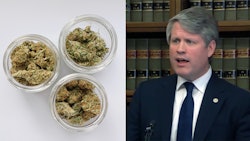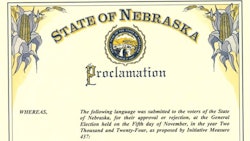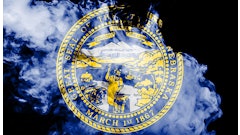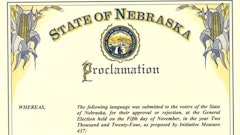
Nebraskans 21 and older will soon have in-state access to regulated cannabis.
The Omaha Tribe of Nebraska, one of four federally recognized tribes in the state, unanimously adopted a cannabis regulatory code, Title 51, through its tribal council on July 15 to legalize both medical and adult-use cannabis on its native reservation in the northeastern part of the state.
The tribe plans to use its sovereignty to sell cannabis in a regulated retail setting, allowing both tribal and non-tribal visitors to purchase products subject to a strict licensing, testing and enforcement system that prioritizes product safety and community health.
“The Omaha Tribe is not waiting on broken systems to deliver,” Omaha Tribal Attorney General John Cartier said in a press release. “We are asserting our sovereign right to govern, protect our community, and build a sustainable economy that reflects our values. Title 51 is the most comprehensive and forward-looking cannabis code in the region, that is rooted in our traditions and designed for our future.”
The Omaha Tribe’s reservation is located mostly in Thurston County, with the tribal seat of government headquartered in Macy, Neb. The reservation’s population is roughly 4,500, according to the 2020 U.S. Census.
The Omaha’s adoption of Title 51 comes as Nebraska state cannabis regulators continue to work toward implementing a medical cannabis program approved by voters in the November 2024 election. Nebraska Gov. Jim Pillen signed emergency regulations on June 29 to regulate a commercial medical cannabis marketplace. The state’s Nebraska Medical Cannabis Commission (NMCC) is tasked with awarding business licenses by October 2025.
However, the Omaha people believe the state’s rollout of a medical cannabis program remains uncertain amid the NMCC being “mired in litigation threats, regulatory confusion and bureaucratic delay.”
Specifically, the NMCC adopted the emergency rules two days after Lancaster County District Judge Susan Strong dismissed a lawsuit filed by former Republican state Sen. John Kuehn, who sought to block the state’s implementation of the voter-approved measure. Also, Nebraska Attorney General Mike Hilgers threatened to sue the regulatory body if it begins issuing licenses.
Hilgers’ threat comes despite 67% of Nebraska voters specifically supporting a measure that calls for awarding the licenses for a commercial marketplace by Oct. 1, 2025.
As that process plays out at the state level, the Omaha people plan to flex their sovereignty by establishing clear rules for a licensed, tested and well-regulated cannabis marketplace that provides full oversight authority to a tribal Cannabis Regulatory Commission.
The tribe’s Title 51 will also:
- Allow medical cannabis access for qualifying patients under tribal law;
- Open pathways for tribal member ownership and business partnerships;
- Reinvest in health care, education and infrastructure; and
- Provide expungement of prior tribal cannabis offenses and a robust social equity framework to repair the harms of past criminalization.
“This is not just about cannabis,” Omaha Tribal Chairman Jason Sheridan said. “It’s about creating real opportunity for our people, asserting our sovereignty, and showing the region what tribal leadership looks like.”
While tribal communities nationwide began tapping the gaming industry as an economic driver, starting with high-stakes bingo in the early 1980s and then casinos following the Indian Gaming Regulatory Act of 1988, cannabis has more recently become another avenue for financial sovereignty within the past decade.
The Omaha Tribe plans to implement its Nebraska cannabis program with a focus on a “responsible” timeline. The tribe’s phased rollout will begin this year, starting with licensing, compliance and public education.
“We are open to working with Nebraska’s health care providers, patients and business leaders as long as our law and sovereignty are respected,” Cartier said. “The tribe is ready to lead. The time to act is now.”
While the Omaha people plan to allow non-tribal visitors to purchase cannabis on their reservation, those who possess 1 ounce or less of cannabis off native land in Nebraska face a $300 fine on the first offense and a misdemeanor penalty with the possibility of jail time on subsequent offenses. However, one of the two measures voters passed in 2024 provides that qualified medical cannabis patients and caregivers can legally possess up to 5 ounces.
Meanwhile, selling or manufacturing any amount of nonmedical cannabis in Nebraska is a felony punishable by up to 20 years in prison with a $25,000 maximum fine.



























